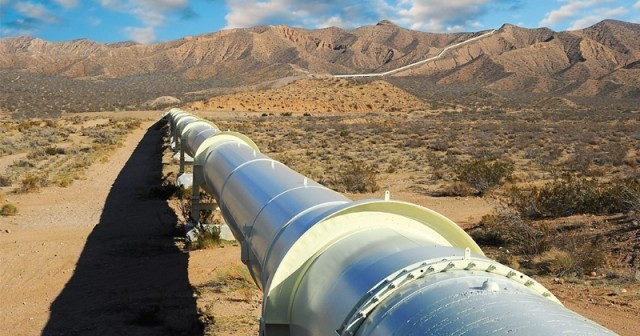Algeria, Niger and Nigeria held talks this week on the revival of a decades-old project to pipe gas across the Sahara, a potential opportunity for Europe to diversify its gas sources.

Niger’s oil ministry said in a statement, following a two-day meeting in Nigeria’s capital, Abuja.
According to the statement, the three countries have set up a task force for the project and designated an entity to update the feasibility study.
The Trans-Saharan gas pipeline is an estimated $13 billion project that could send up to 30 billion cubic metres a year of supplies to Europe.
The idea was first proposed more than 40 years ago and an agreement signed between the countries in 2009, but progress stalled.
The revival comes at a strategic time, as the European Union seeks to wean itself off Russian gas following Russia’s invasion of Ukraine, and is seeking alternative sources.
The pipeline would allow Europe to diversify its sources of natural gas supply and also give several African states to access this high value energy source.
With a length of 4,128km (2,565 miles), the pipeline would start in Warri, Nigeria, and end in Hassi R’Mel, Algeria, where it would connect to existing pipelines that run to Europe.
Nigeria also took steps this month to move forward on another long-awaited pipeline, which would go through West Africa and Morocco to Europe.
Energy ministers of the three countries will meet again in Algiers at the end of July to validate the proposals of the newly installed task force, the statement added.
In a related development, Mauritania’s oil minister, Abd Esselam Ould Mohamed Salah, said on Thursday, June 23, 2022, that Europe’s move away from Russian gas provides a ready and lucrative market for a vast project being developed in West Africa.
As Russia has reduced gas supplies to Europe and Europe seeks to limit its dependence on Russian gas, Africa has an opportunity to fill the gap, but it needs to act now before a longer-term shift to low carbon energy limits the West’s appetite for fossil fuel.
“In this 10-year period from now ’til 2030, priority is given to exploiting all the potential of the country in terms of gas,” Salah told the African Energy Forum in Brussels.
“Recent prices have opened the opportunity for Mauritania, Senegal as well as other African countries to export more gas to Europe,” he said.
“Europe needs to diversify its supply resources, so that fantastic opportunity – we need not miss it,” he added.
The BP-operated the Greater Tortue Ahmeyim gas project straddling Mauritania and Senegal is scheduled to start production by December 2023, he said, while another smaller field ought to be online by 2025.
German Chancellor Olaf Scholz visited Senegal last month to convey the major gas importer’s interest in helping to develop gas resources there as it seeks alternatives to Russian supplies.
Europe’s benchmark gas prices this week hit levels up by more than 300 per cent compared to a year ago and high energy prices are ramping up inflation that is near four-decade highs in some developed countries, adding to fears of recession.
The International Energy Agency said on Wednesday, June 22 that a reduction in flows from Russia to Europe could foreshadow a total cutoff and urged the continent to begin preparing for a deeper supply crunch immediately.
